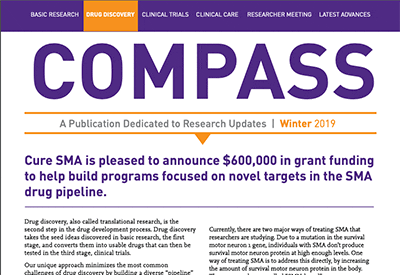
Genentech, a member of the Roche Group, shared two-year data from Part 1 of its pivotal SUNFISH trial in people aged 2-25 years with Type 2 or 3 spinal muscular atrophy (SMA). This was presented at the 2020 Virtual SMA Research & Clinical Care Meeting. The results of an exploratory efficacy analysis show risdiplam significantly improved motor function after 24 months of treatment compared to natural history data. In addition, preliminary 12-month data from JEWELFISH, a trial in people with all types of SMA aged 6 months to 60 years previously treated with other SMA therapies, showed that treatment with risdiplam led to rapid and sustained increases in survival motor neuron (SMN) protein levels. No new safety signals were observed and the overall adverse event profile was consistent with that of treatment-naive patients.
SUNFISH is a large (n=231), global two-part study in children and adults. The dose-finding SUNFISH Part 1 (n=51) includes a broad patient population ranging from individuals unable to sit to those capable of walking, as well as people with scoliosis or joint contractures. The exploratory efficacy analysis of Part 1 of the SUNFISH study assessed motor function, using the Motor Function Measure (MFM) scale. MFM is a validated scale used to evaluate fine and gross motor function in people with neurological disorders, including SMA. It assesses different motor functions from standing and walking to use of hands and fingers. In a weighted analysis comparing the data with a robust natural history comparator cohort, MFM total change from baseline at Month 24 was greater in patients receiving risdiplam (3.99 point difference [95% CI: 2.34, 5.65] p<0.0001). Even small changes in motor function can result in meaningful differences to daily living.
Results also showed that treatment with risdiplam led to a median two-fold increase in blood SMN protein levels after four weeks, which was sustained for at least 24 months. This is consistent with previously reported results through 12 months of treatment. SMN protein is found throughout the body and is critical for maintaining healthy motor neurons, which transmit movement signals from the central nervous system to the muscles. These results are consistent with the results of the pivotal Part 2 of the trial at 12 months in non-ambulatory patients which demonstrated that change from baseline in total MFM-32 score was significantly greater in people treated with risdiplam, compared to placebo (1.55 point mean difference; p=0.0156).
The most common adverse events in Part 1 of the SUNFISH study were fever (pyrexia; 55%), cough (35%), vomiting (33%), upper respiratory tract infections (31%), cold (nasopharyngitis; 24), and sore throat (oropharyngeal pain; 22%). The most common serious adverse event that occurred in three of the 51 patients exposed to risdiplam was pneumonia. To date there have been no treatment-related safety findings leading to withdrawal.
Enrollment for the JEWELFISH study, assessing safety and pharmacodynamic data in previously treated patients with SMA, who are now receiving risdiplam, is complete (n=174). Among the patients who completed 12 months of treatment with risdiplam, a median two-fold increase in SMN protein versus baseline was observed (n=18). An early assessment of safety showed a consistent safety profile compared to treatment-naive patients. Of the 174 patients enrolled, 76 were previously treated with nusinersen and 14 with onasemnogene abeparvovec. The remaining 83 patients had been treated with compounds then being developed by Genentech.
The most common adverse events were upper respiratory tract infections (13%), headache (12%), fever (8%), diarrhea (8%), nasopharyngitis (7%) and nausea (7%). To date there have been no drug-related safety findings leading to withdrawal from the JEWELFISH trial and the overall adverse event profile is similar to that observed in risdiplam trials of patients not previously treated with an SMA-targeting therapy.
Risdiplam’s comprehensive clinical trial program (birth to 60 years old) was designed to represent the broad, real-world spectrum of people living with this disease with the aim of ensuring access for all appropriate patients. Genentech leads the clinical development of risdiplam, an investigational, orally administered survival motor neuron-2 (SMN-2) splicing modifier for SMA, as part of a collaboration with the SMA Foundation and PTC Therapeutics.
In November 2019, the U.S. Food and Drug Administration granted Priority Review for risdiplam with an expected decision on approval by August 24, 2020.
About risdiplam
Risdiplam is an investigational survival motor neuron-2 (SMN-2) splicing modifier for SMA and is orally administered daily in liquid form by mouth or via feeding tube. It is designed to increase and sustain SMN protein levels both throughout the central nervous system and in peripheral tissues of the body. It is being evaluated for its potential ability to help the SMN-2 gene produce more functional SMN protein throughout the body. Risdiplam is currently being evaluated in four multicenter trials in people with SMA:
- FIREFISH (NCT02913482) – an open-label, two-part pivotal clinical trial in infants with Type 1 SMA. Part 1 was a dose-escalation study in 21 infants with the primary objective of assessing the safety profile of risdiplam in infants and determining the dose for Part 2. Part 2 is a pivotal, single-arm study of risdiplam in 41 infants with Type 1 SMA treated for 24 months, followed by an open-label extension. Enrollment for Part 2 was completed in November 2018. The primary objective of Part 2 was to assess efficacy as measured by the proportion of infants sitting without support after 12 months of treatment, as assessed in the Gross Motor Scale of the Bayley Scales of Infant and Toddler Development – Third Edition (BSID-III) (defined as sitting without support for 5 seconds). The study met its primary endpoint.
- SUNFISH (NCT02908685) – SUNFISH is a two-part, double-blind, placebo controlled pivotal study in people aged 2-25 years with Types 2 or 3 SMA. Part 1 (n=51) determined the dose for the confirmatory Part 2. Part 2 (n=180) evaluated motor function using total score of Motor Function Measure 32 (MFM-32) at 12 months. MFM-32 is a validated scale used to evaluate fine and gross motor function in people with neurological disorders, including SMA. The study met its primary endpoint.
- JEWELFISH (NCT03032172) – an open-label exploratory trial in people with SMA aged 6 months-60 years who have been previously treated with SMA-directed therapies. The study has completed recruitment (n=174).
- RAINBOWFISH (NCT03779334) – an open-label, single-arm, multicenter study, investigating the efficacy, safety, pharmacokinetics and pharmacodynamics of risdiplam in babies (~n=25), from birth to six weeks of age (at first dose) with genetically diagnosed SMA who are not yet presenting with symptoms. The study is currently recruiting.



